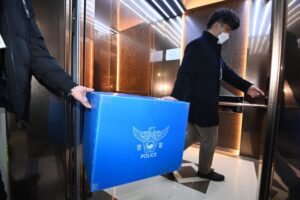

Why NDDC is investing in digital learning — Ogbuku
By Barth Ndubuwah, Port Harcourt
The Managing Director of the Niger Delta Development Commission (NDDC), Dr Samuel Ogbuku, has emphasised the Commission’s commitment to investing in digital learning, believing it is key to unlocking untapped potential and shaping the future of the Niger Delta region.
Speaking during an interactive session with journalists at the NDDC’s headquarters in Port Harcourt, Ogbuku outlined the Commission’s determination to harness technology to build a brighter future for the region, ensuring that every child has the necessary tools and opportunities to succeed.
He revealed that the NDDC, in collaboration with the Renewed Hope Initiative (RHI) led by Nigeria’s First Lady, Senator Oluremi Tinubu, had launched a large-scale digital education initiative. The project aims to distribute 45,000 U-Lesson tablets to primary and secondary schools across the nine states of the Niger Delta region.
According to Ogbuku, the initiative aims to enhance educational opportunities in the region through the distribution of U-Lesson tablets and software designed to improve student literacy and learning outcomes.
He explained that the initiative seeks to foster a conducive learning environment by integrating digital resources, which aligns with the United Nations’ Sustainable Development Goal 4, which calls for inclusive and equitable quality education.
“This initiative is about being pragmatic and positioning our region for the future,” Ogbuku said.
“Digital education became crucial during the COVID-19 pandemic. The pandemic demonstrated that interpersonal learning would soon be a thing of the past. Even churches were operating through online platforms during the lockdown. We want our children to be comfortable using computers and other digital devices for learning.”
He also noted that some students sent abroad for postgraduate studies struggle to adapt to the highly digitalised modern world, highlighting the importance of equipping students in the Niger Delta with the skills they need to thrive in a technology-driven society.
“Education is evolving, just like our phones are constantly updated with new software,” he said.
“We must ensure that our students are equipped to compete globally when they graduate. This is why we are investing in their digital learning.”
Ogbuku further explained that the U-Lesson software is tailored to Nigeria’s educational framework, featuring an offline video library that allows students to access educational content without requiring an internet connection.
He stressed that this digital tool complements traditional face-to-face instruction and empowers students to master their subjects and excel in exams.
“We believe every student in our region deserves a quality education,” Ogbuku said. “We are committed to providing the resources necessary to make this a reality.”
In addition, Ogbuku spoke about the NDDC’s Foreign Post-Graduate Scholarship Programme, revealing that 2,700 students from the Niger Delta had benefited from the scheme since its inception in 2010.
He explained that the programme had been reactivated and strengthened, with a greater focus on merit-based selection and increased funding to avoid past challenges.
“We have made educational development and human capacity building our key policy priorities,” Ogbuku concluded.
“The negative narrative of the NDDC is changing due to our sustained efforts to chart a new course of development for the region.”




